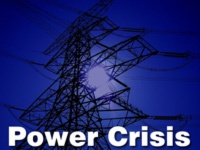General News of Monday, 21 May 2007
Source: BusinessDay
Ghana to lose $1.4 Billion

Ghana’s growing manufacturing, services and informal sectors stand threatened and the economy may well lose $1.4-billion at the end of the year if the country’s current energy crisis is not arrested, a new research has warned.
The country’s manufacturing sector suffered a major setback two months ago when VALCO Aluminium, one of its leading manufacturers, closed operations sending into the labour market its 170 workers.
"More closures are likely if the worsening situation is not treated as a matter of urgency," said Tony Oteng-Gyasi, president of the Association of Ghana Industries (AGI) at a forum organised by his group where the new findings were made public in Accra, Ghana.
The research conducted by Data Bank, one of Ghana’s leading financial service providers, reveals that four key sectors of the country’s economy incur extra costs of $120-million monthly on energy.
According to Daniel Ogbamey Tetteh, head of research unit of Data Bank, the impact, however, varies from industry to industry depending on the energy requirement needs and cost structure, adding that it would be difficult to make sweeping assumptions on the overall impact on businesses.
As part of measures to address the energy crisis, Joseph Kofi Adda, Ghana’s energy minister, said the government planned to establish a new company, Ghana Grid Company (GRIDCO), to help in the transmission of hydro-electric power, a function that is currently performed by the Volta River Company (VRA). Established in 1961, VRA’s primary function is to generate and supply electricity for industrial, commercial and domestic use in Ghana.
But many observers doubt if the establishment of the new company will make any significant difference to the situation. "It will be just like what happened in Nigeria where the name of NEPA was changed and yet there was no real difference in the power supply situation," said Kwame Gyasi, an Accra-based IT expert. "It does seem to us that the government has run out of ideas as to how the energy problem should be tackled in the short and long term."
Ghana began a cyclical power rationing exercise last September and despite the fact that it has been reviewed several times, many accuse the Electric Company of Ghana and the Volta River Authority of not adhering to it. The Accra Mail, one of the private newspapers in the country, voiced this frustration in its editorial of May 7, 2007:
"Our concern is about how the VRA and ECG are managing the problem. To be brutally frank, it is not good enough. After giving us the load-shedding schedules, they flout it with such impunity as to make the whole exercise meaningless. Unless, there is an even bigger problem, which they are not telling us, we find it most unacceptable for them to treat us that way - power crisis or not!"
However, the minister for energy has outlined a number of emergency measures aimed at redressing the situation. "We have currently installed automation plants that are supposed to give us 50 megawatts of power. As I speak, additional plants of 20 megawatts have been installed and are being tested and waiting for commissioning. By the 15th (last Thursday we would be able to get 20 megawatts out of these plants," he said.
So severe is the crisis that Ghanaians can hardly stop talking about it, with rumours rife about the course it will take. As the country is plunged into darkness with increasing frequency , a frustrated public now treats every assurance from government with cynicism.










